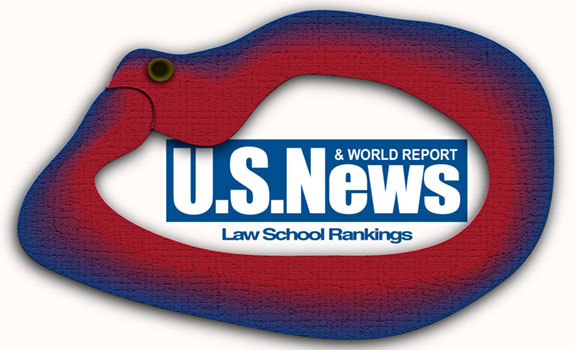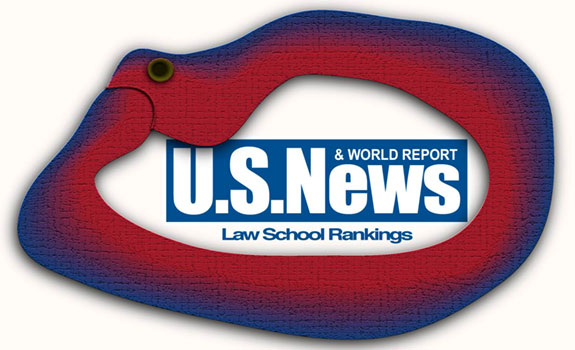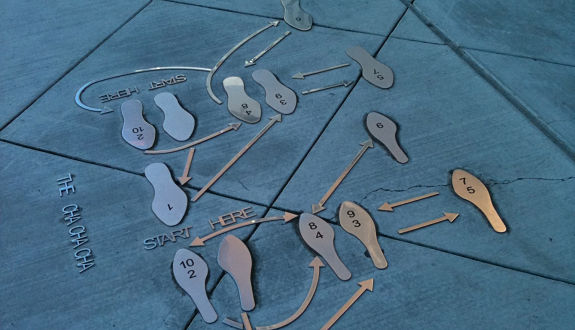Why U.S. News Law School Rankings Are Lame
- by
- Jun 18, 2009
- Law School Rankings
- Reviewed by: Matt Riley


Every year when the U.S. News and World Report (hereafter USNWR) ranking of law schools comes out, I’m annoyed. Not just watered down drink, cold entree, stain on your new shirt annoyed either, but deeply existentially troubled.
Riley just wrote a piece about the USNWR rankings and, in doing so, he brought it all back. And now, I’m suffering again. Allow me to explain why.
First, I’m not casting aspersions on the people who compile this report. I’m sure they’re all intelligent and well-meaning people. (Or not, but either way it has no bearing on my annoyance).
Second, I’m not just rehashing the recently-reported news that certain schools, in particular Clemson, are gerrymandering adjusting their administrative procedures to improve their ranking, even if the changes fail to improve students’ experiences.
Nor will I focus on the earlier reported story that Brooklyn Law School may have misreported their incoming students’ LSAT/GPA data to improve their ranking.
(Brooklyn Law School described the misreporting as “completely inadvertent”— to be distinguished from those somewhat inadvertent mistakes that improve a law school’s ranking.)
But for reasons not associated with any of the above, I still think this report is harmful and that we all have an obligation to battle against its influence, though I have no idea how we possibly could.
It’s hard to believe that anyone reading this blog doesn’t know this already, but just in case, here are the basics. USNWR publishes a ranking of law schools every year and it is, without question, the best known, most cited, and most influential ranking of its kind. Law school applicants, law school students, lawyers, hiring partners at law firms, judges, and people’s moms all read it and take secret mental notes of its rankings. It is the definitive pronouncement of law school class hierarchy.
And I don’t mean that people just pick it up at the supermercado and page through it while waiting in line, the way you do with Men’s Health or Life and Style. Nor am I singling out the rabid, frothing lunatics knows as LSAT students/law school applicants.
Rather, allegedly sane people pore over this report and suffer its rankings. I’ve heard 2Ls at a good law school bemoan their school’s dropping a few places in the most recent ranking because they thought their employment opportunities commensurately sank. I also recall a lawyer several years into practice so concerned about her former law school’s drop that she contemplated calling the law school to see what could be done.
I mean, really.
Here’s the sound-bite version of my problem: USNWR is, unfortunately, famous for being famous. Because of its influence, while it purports to merely compile an objective ranking of law schools based on relevant criteria, the USNWR ranking is performative, not descriptive. It’s not that USNWR reflects an independent hierarchy that they’re tracking, rather their report literally creates and perpetuates hierarchy.
That admittedly sounds hyperbolic and perhaps crazy; so let me explain.
Among the most important criteria by which schools are based are (1) student selectivity/LSAT score and (2) ranking by lawyers/judges/members of the clergy, etc…
I’ll speak to these individually, the first in this blog entry and the second in the next.
On Student Selectivity/Higher LSAT
The better a school’s admitted students, the higher-ranked a school is on USNWR. This makes sense because the quality of the student body largely defines the quality of the law school. However, the problem is that when applicants are deciding where to apply to law school, they generally turn to USNWR to see which schools are ranked highest.
We should be forthright in admitting that law school applicants frequently have little or no non-USNWR information about the schools to which they’re applying (except, perhaps, for the location of the school). My own anecdotal, but fairly extensive, survey of students applying to law schools suggests that they are generally unaware of differences among schools relating to cost, atmosphere, and educational ideology. Some applicants do more extensive research, but virtually ALL of them read USNWR closely, and some of them don’t look at much else.
Here’s how it works in the ordinary case: When an applicant is applying to law school, she looks at USNWR and applies to a swath of schools into which she stands some chance of gaining admittance. The higher-ranked schools are most sought because they’re higher-ranked, and thus they get both (1) more applications and (2) applications from the best qualified students. So, just to be clear, a higher USNWR ranking ensures more and better applicants. The problem is that having more and better applicants was the justification for the higher ranking in the first place.
This appears to be one of life’s more blatant instances of circularity and self-reinforcement. To illustrate this more clearly, consider the following:
If by some terrible mistake Chop Shop Law School was ranked 1st in USNWR tomorrow (and the authors of the report came up with some story to justify the ranking) the following would almost certainly occur. Chop Shop would be deluged by applications, from which they would then accept only the best qualified (highest LSAT/GPA).
In such a case, merely because of its higher USNWR rank, Chop Shop would immediately become a very selective law school with a high average LSAT/GPA among its entering students.
The difficulty is that these very facts (student selectivity and high LSAT/GPA index) were (part of) the cause for the higher USNWR ranking the the first place, and yet they’re also the effect of the USNWR ranking. The principal difficulty is that the mere fact that a school has a high ranking encourages behavior in applicants that will ensure this high ranking in the future.
From the applicant’s perspective it’s sketchy as well: the guy with the 4.0/180 will apply to highly ranked schools on USNWR because he’s assuming that USNWR has compiled an independent ranking. Little does he know that his application is itself establishing next year’s ranking.
The ranking system is, in this way, self-perpetuating both because a high rank will virtually assure a high rank in the future, and, conversely, a low rank will make it difficult to attract the number and quality of applicants required to raise the ranking.
Lame. And if you think that’s bad, just wait till you hear about how the opinions of lawyers and judges affect the rankings. Stay tuned.
Article by Trent Teti of Blueprint LSAT Preparation.
Search the Blog

Free LSAT Practice Account
Sign up for a free Blueprint LSAT account and get access to a free trial of the Self-Paced Course and a free practice LSAT with a detailed score report, mind-blowing analytics, and explanatory videos.
Learn More
Popular Posts
-
logic games Game Over: LSAC Says Farewell to Logic Games
-
General LSAT Advice How to Get a 180 on the LSAT
-
Entertainment Revisiting Elle's LSAT Journey from Legally Blonde








